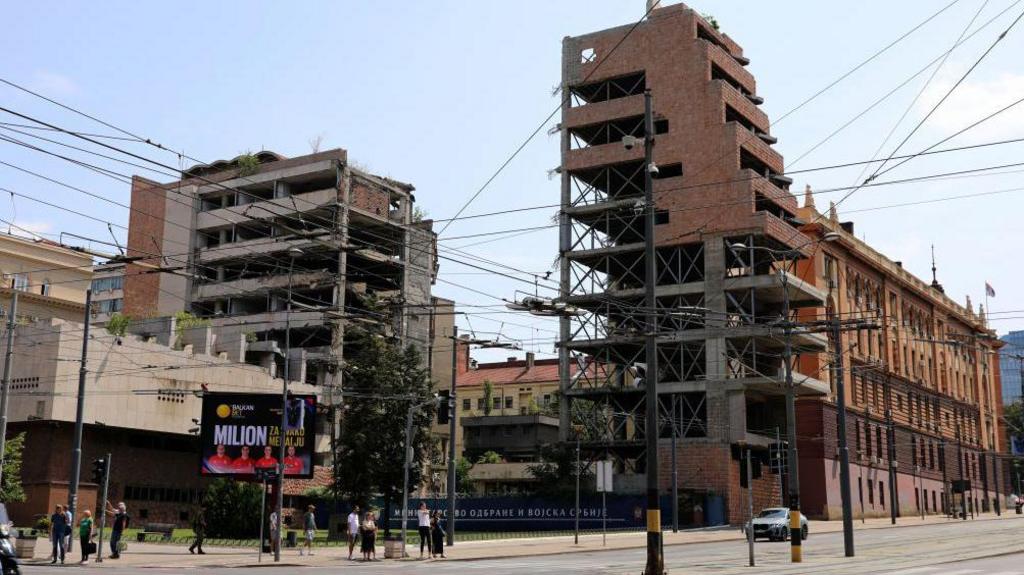A striking sight greets visitors to Belgrade: the bombed-out remains of Serbian government buildings, casualties of the 1999 NATO intervention. These damaged structures serve as a stark reminder of Serbia’s turbulent past and its ongoing grappling with its legacy.
The partially-destroyed Defence Ministry buildings, resembling a smile marred by missing teeth, stand as a potent symbol of this unresolved history. The bombing, involving the United States as a key NATO member, adds a layer of complexity to the narrative.
Against this backdrop, the Serbian government’s 2023 decision to partner with Affinity Global, founded by Jared Kushner, on a $500 million luxury development—dubbed Trump Tower Belgrade—caused considerable surprise and controversy.
This decision, while seemingly aligning with a pattern of allowing foreign investors to profit from public land, as alleged by the opposition (evidenced by the Belgrade Waterfront project), is particularly sensitive given the site’s historical significance.
The Defence Ministry complex not only serves as a memorial to the 1999 bombing victims but also visually reinforces strong anti-NATO sentiment and pro-Russia sympathies among many Serbians. Leasing the site to a U.S. developer for 99 years, reportedly without upfront payment, is a bold, potentially divisive move.
President Aleksandar Vučić defends the decision, emphasizing the importance of improving U.S.-Serbian relations and overcoming the burden of 1999. This view resonates with some in Belgrade’s international business community, keen to attract foreign investment to boost a GDP per capita significantly lower than the EU average.
While the financial details remain opaque, the *New York Times* reports the Serbian government will receive 22% of future profits. James Thornley, a financial consultant in Belgrade, argues that such large-scale foreign investment is beneficial, despite sensitivities surrounding the site.
However, others express concerns. Andrew Peirson, of iO Partners, questions the lack of an open tendering process, suggesting the deal lacked transparency and potentially deprived other investors of a fair chance. He highlights the contrast with more transparent processes in other European nations.
Further complicating matters are reported meetings between Vučić and Kushner, followed by visits from Donald Trump Jr., raising questions about potential conflicts of interest. While the Trump family’s role is reportedly limited to the hotel component, the lack of open bidding remains a point of contention.
Peirson worries this may alienate existing investors. Both Affinity Global and the Serbian government have not responded to requests for comment on the tendering process.
Adding another layer of complexity is the architectural and historical significance of the site, originally designed to welcome visitors to the capital of Tito’s Yugoslavia and granted protected status in 2005. Estela Radonjic Zivkov, former deputy director of Serbia’s Institute for the Protection of Monuments, criticizes the demolition plans.
A dramatic twist emerged on May 14th when Goran Vasic, the official who lifted the site’s protected status, was arrested for alleged fabrication of documents. This fuels opposition claims of preferential treatment for Kushner, which the Serbian government denies.
The future of the Trump Tower Belgrade project remains uncertain. Affinity Global has stated it will “review this matter and determine next steps,” while Vučić maintains there is no issue. For now, the scarred visage of the Defence Ministry complex continues to serve as a powerful symbol—and a compelling talking point—in Belgrade.

